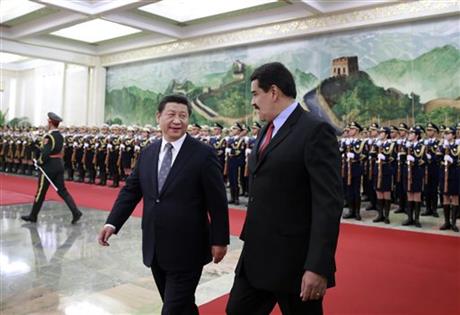
Venezuela’s President Nicolas Maduro met Thursday with Chinese leader Xi Jinping amid hopes for new loans to bolster the South American nation’s stricken economy.
Xi reiterated the importance of relations during talks between the two leaders at the Great Hall of the People in Beijing, saying the two countries enjoyed a “cooperative strategic partnership” and would deepen cooperation in all areas.
There was no immediate word on new Chinese loans.
But after the meeting, the third between the two leaders since Maduro took power in 2013, the Venezuelan president said that during the trip, his government had drummed up Chinese investments in energy, technology and infrastructure projects worth $20 billion.
“Sometimes there’s a conspiracy to try and make the world see Venezuela as bankrupt,” Maduro told journalists, highlighting the investments as a show of confidence in the country’s socialist revolution. “Venezuela is an economic power in its own right, with a productive population and giant potential.”
China is Venezuela’s largest creditor and has loaned it more than $40 billion over the past five years, some of which has been paid back in the form of oil deliveries. While Beijing is eager to keep relations healthy, it may become reluctant to continue lending the South American country large sums if prospects for repayment dim.
Maduro traveled to China on Sunday along with the presidents of Ecuador and Costa Rica for high-level talks on Chinese trade, investment and financial support in Latin America. On Tuesday, Ecuador said it secured a $5.3 billion credit line from China’s Eximbank.
China last year loosened its lending terms to Venezuela, extending a deadline for repayment and ending minimum shipment requirements.
Venezuela is struggling with the world’s highest inflation rate, a recession and a cash crunch worsened by a steep fall in the price of oil.
It has so far unsuccessfully urged OPEC nations to work together to drive up oil prices, which have fallen by half in six months. Venezuela depends on oil for 95 percent of its export income.
—
AP Writer Joshua Goodman contributed to this report from Bogota, Colombia



